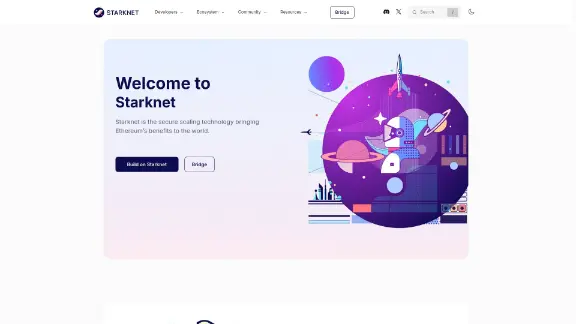Starknet (STRK)
Starknet is a permissionless Validity-Rollup, also known as a ZK-Rollup, operating as a Layer 2 network atop Ethereum. It allows decentralized applications (dApps) to scale efficiently without sacrificing security.
Overview
Starknet functions as a Layer 2 blockchain facilitating large-scale computation for any dApp while maintaining Ethereum's composability and security. By leveraging the STARK cryptographic proof system, it achieves secure, low-cost transactions and high performance. Starknet contracts are written in Cairo, a specially designed programming language. Starknet was developed by StarkWare Industries, an Israeli blockchain company, and launched in February 2022 as a permissionless Layer 2 network. The project was co-founded by Eli Ben-Sasson, who serves as the president of StarkWare. The development and adoption are guided by the Starknet Foundation, led by CEO Diego Oliva.

| Ticker | STRK |
| Category | Infrastructure |
| Website | https://starknet.io/ |
| @Starknet | |
| Contract Addresses | |
|---|---|
| ethereum | 0xca...66 Copied! Copied! |
| starknet | 0x47...8d Copied! Copied! |
Technology
How Starknet scales Ethereum
Starknet addresses Ethereum's scalability by utilizing a Validity Rollup solution. This method processes transactions off the Ethereum Mainnet, consolidating them into off-chain blocks and summarizing them into a single on-chain transaction. STARK proofs are used to ensure transaction integrity, allowing significant scalability without compromising security or decentralization.
The Starknet sequencer
The Starknet Sequencer is essential for validating and executing transactions and proposing blocks. It groups transactions for collective processing, identifying unsuccessful ones while allowing successful transactions to form a block. Starknet's sequencers can manage more transactions per second compared to Ethereum nodes.
The Starknet prover
The Prover confirms the mathematical validity of block transactions by generating a STARK proof. Transactions are processed in groups, with the Prover documenting every step in an Execution Trace. It tracks system state changes, known as the State Diff. An algorithm then expands the Execution Trace data, and the Prover samples this data to create a STARK proof, validating numerous transactions.
Secure settlement on Ethereum
The STARK proof and State Diff are sent to Ethereum as a transaction. Ethereum nodes unpack these components, which are processed by two smart contracts: the Verifier and Starknet Core. The Verifier analyzes the proof for any issues, and upon validation, it moves to Starknet Core. This contract authenticates the proof and confirms the State Diff, updating the Starknet state on Ethereum. The updated state is then included in an Ethereum block, validated by the network, and once finalized, becomes an immutable part of Ethereum.
STRK Token
The Starknet token ($STRK) facilitates network operations by covering fees, supporting network security through staking, and enabling governance decisions via voting on Starknet’s values and technology goals. Initially used for transaction fees in Ether (ETH), the STRK token became available for claiming on the Starknet Mainnet in February 2024.
Tokenomics
In May 2022, StarkWare created ten billion Starknet tokens, minted on-chain in November 2022. These tokens were allocated as follows: 20.04% to early contributors, 18.17% to investors, 10.76% to StarkWare, 12.93% for grants and development partners, 9.00% for community provisions, 9.00% for community rebates, 10.00% for the Foundation's strategic reserves, 8.10% for the Foundation treasury, and 2.00% for donations.
The Starknet Foundation
Established in November 2022, the Starknet Foundation aims to fulfill Starknet’s decentralization goals. It was launched with 50.1% of the initial token supply to ensure effective resource deployment for maintaining and securing Starknet, developing the network, and fostering collaboration among developers. The foundation focuses on community engagement, network development, research, and decentralization by enhancing governance and decentralizing sequencing and proving. The board consists of seven members, including Andrew McLaughlin, Prof. Eli Ben-Sasson, Eric Wall, Heather Meeker, Prof. Shubhangi Saraf, Tomasz Stańczak, and Uri Kolodny.
In May 2024, the foundation launched a $5 million grant program to support emerging projects, aiming to assist at least 200 teams with funding to launch on Starknet. Later that month, Starknet introduced a $25 million token incentive for top projects as part of its Catalyst program, rewarding the best-performing projects based on various metrics. The program seeks to drive innovation on Starknet's Ethereum layer-2 scaling solution using zero-knowledge rollup technology. Six initial projects qualified for the grants, including Ekubo, AVNU, Influence, Realms, Nostra, and ZKX.
